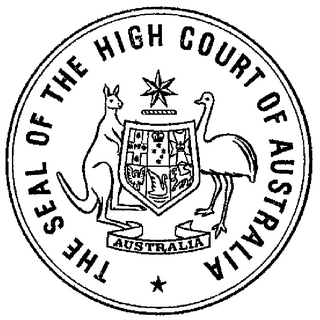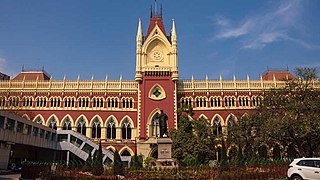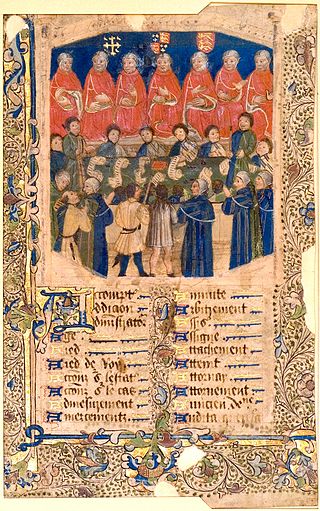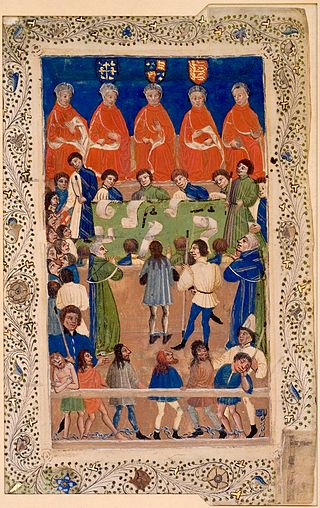Related Research Articles
A grand jury is a jury—a group of citizens—empowered by law to conduct legal proceedings, investigate potential criminal conduct, and determine whether criminal charges should be brought. A grand jury may subpoena physical evidence or a person to testify. A grand jury is separate from the courts, which do not preside over its functioning.

The Judicial Committee of the Privy Council (JCPC) is the highest court of appeal for the Crown Dependencies, the British Overseas Territories, some Commonwealth countries and a few institutions in the United Kingdom. Established on 14 August 1833 to hear appeals formerly heard by the King-in-Council, the Privy Council formerly acted as the court of last resort for the entire British Empire, other than for the United Kingdom itself.
The Courts of England and Wales, supported administratively by His Majesty's Courts and Tribunals Service, are the civil and criminal courts responsible for the administration of justice in England and Wales.

A justice of the peace (JP) is a judicial officer of a lower court, elected or appointed by means of a commission to keep the peace. In past centuries the term commissioner of the peace was often used with the same meaning. Depending on the jurisdiction, such justices dispense summary justice or merely deal with local administrative applications in common law jurisdictions. Justices of the peace are appointed or elected from the citizens of the jurisdiction in which they serve, and are usually not required to have any formal legal education in order to qualify for the office. Some jurisdictions have varying forms of training for JPs.

The High Court of Australia is the apex court of the Australian legal system. It exercises original and appellate jurisdiction on matters specified in the Constitution of Australia and supplementary legislation.
The court leet was a historical court baron of England and Wales and Ireland that exercised the "view of frankpledge" and its attendant police jurisdiction, which was normally restricted to the hundred courts.
A husting originally referred to a native Germanic governing assembly, the thing. By metonymy, the term may now refer to any event during an election campaign where one or more of the candidates are present.

The Supreme Court of the United Kingdom is the final court of appeal in the United Kingdom for all civil cases, and for criminal cases originating in England, Wales and Northern Ireland. As the United Kingdom's highest appellate court for these matters, it hears cases of the greatest public or constitutional importance affecting the whole population.

The Calcutta High Court is the oldest High Court in India. It is located at Esplanade Row West, Kolkata, West Bengal. It has jurisdiction over the state of West Bengal and the Union Territory of the Andaman and Nicobar Islands. The High Court building's design is somewhat based on the Lakenhal in Ypres in Flanders, Belgium.

The Court of Common Pleas, or Common Bench, was a common law court in the English legal system that covered "common pleas"; actions between subject and subject, which did not concern the king. Created in the late 12th to early 13th century after splitting from the Exchequer of Pleas, the Common Pleas served as one of the central English courts for around 600 years. Authorised by Magna Carta to sit in a fixed location, the Common Pleas sat in Westminster Hall for its entire existence, joined by the Exchequer of Pleas and Court of King's Bench.

The Matrimonial Causes Act 1857 was an Act of the Parliament of the United Kingdom. The Act reformed the law on divorce, moving litigation from the jurisdiction of the ecclesiastical courts to the civil courts, establishing a model of marriage based on contract rather than sacrament and widening the availability of divorce beyond those who could afford to bring proceedings for annulment or to promote a private Bill. It was one of the Matrimonial Causes Acts 1857 to 1878.

The Hundred of Narberth was a hundred in Pembrokeshire, Wales. An administrative and legal division, it was formed by the Act of Union of 1536 from parts of the pre-Norman cantrefs of Penfro and Cantref Gwarthaf.
The Royal Commission on the Corporation of the City of London was a royal commission, established in 1853, which considered the local government arrangements of the City of London and the surrounding metropolitan area.

The Court of King's Bench, formally known as The Court of the King Before the King Himself, was a court of common law in the English legal system. Created in the late 12th to early 13th century from the curia regis, the King's Bench initially followed the monarch on his travels. The King's Bench finally joined the Court of Common Pleas and Exchequer of Pleas in Westminster Hall in 1318, making its last travels in 1421. The King's Bench was merged into the High Court of Justice by the Supreme Court of Judicature Act 1873, after which point the King's Bench was a division within the High Court. The King's Bench was staffed by one Chief Justice and usually three Puisne Justices.

The Heritable Jurisdictions (Scotland) Act 1746 was an Act of Parliament passed in the aftermath of the Jacobite rising of 1745 abolishing judicial rights held by Scots heritors. These were a significant source of power, especially for clan chiefs since it gave them a large measure of control over their tenants.

The High Court of Justice in London, known properly as His Majesty's High Court of Justice in England, together with the Court of Appeal and the Crown Court, are the Senior Courts of England and Wales. Its name is abbreviated as EWHC for legal citation purposes.

The Administration of Justice (Language) Act (Ireland) 1737 was passed by the Parliament of Ireland in 1737. The statute was primarily directed at the perceived problem caused by the widespread use of Law French and Latin in courts but has had the effect of excluding autochthonous languages, given that it excludes the use of "any other tongue or language whatsoever".

The Piracy Act 1850, sometimes called the Pirates Repeal Act 1850, is an Act of the Parliament of the United Kingdom. It relates to proceedings for the condemnation of ships and other things taken from pirates and creates an offence of perjury in such proceedings.

The Administration of Justice Act 1977 is an act of the Parliament of the United Kingdom.
Certain former courts of England and Wales have been abolished or merged into or with other courts, and certain other courts of England and Wales have fallen into disuse.
References
- ↑ Helmholz, R. H. (2003). The Oxford history of the laws of England . Oxford New York: Oxford University Press. ISBN 9780198258179.
- ↑ Administration of Justice Act 1977, Schedule 4, Part III
- ↑ "London Metropolitan Archives, Information Leaflet Number 13, The Court of Common Council" (PDF). Archived from the original (PDF) on 2013-09-05. Retrieved 2014-03-28.